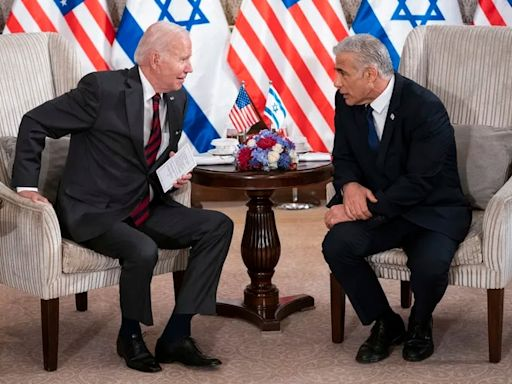Israeli Prime Minister Yair Lapid promised that "there would be no nuclear Iran" during their Thursday meeting with President Joe Biden to discuss Iran's rapidly developing nuclear programme. The US president, who will visit Saudi Arabia on Friday, reportedly also emphasised to Lapid how crucial it is for Israel to "fully integrate" into the region.
The focus of Biden's 48-hour visit to deepen the
existing close ties between the US and Israel will be their one-on-one
discussions. The leaders also released a joint statement highlighting military
cooperation and a pledge to stop Iran from gaining a nuclear weapon, which
Israel views as an adversary.
Lapid told reporters later that day, "We talked
about the Iranian threat. Iran won't develop nuclear weapons. Israeli officials
have attempted to use Biden's first trip to the Middle East as president to
highlight how far forwards Iran's nuclear programme has advanced and to
encourage the Biden administration to thwart efforts to resurrect a 2015
agreement with Iran that would have limited it.
As soon as he took office, Biden made reviving the
Iran nuclear agreement, which was negotiated by Barack Obama's administration
and abandoned by Donald Trump in 2018, a top goal. However, administration
officials are growing more gloomy about the prospects of Tehran returning to
compliance.
The United States declared in the joint declaration
that it is prepared to deploy "all components of its national might"
to stop Iran from acquiring a nuclear weapon. In an interview with Israel's
Channel 12 that aired on Wednesday, Biden gave resounding assurances about his
commitment to preventing Iran from developing a nuclear weapon, saying he would
be prepared to use force as a "last resort" if required.
Iran revealed last week that it had advanced its
uranium enrichment process to a purity level of 60%, which is still below that
needed for weapons.
The joint statement that will be made public on
Thursday may have significant symbolic significance for Biden's meeting with
Arab leaders this weekend in Saudi Arabia as he strives to cement a regional
alliance against Iran. After their one-on-one encounter, Biden said, "I
talked about how crucial it was... for Israel to be totally integrated in the
area."
The meeting on Thursday might also help Lapid,
Israel's interim prime minister until the fifth election in less than four
years, which will take place in November. The former Prime Minister Benjamin
Netanyahu is Lapid's biggest rival, and the combined appearance with Biden may
enhance Netanyahu's reputation as a statesman and leader.
Additionally, on Thursday, Biden and Lapid planned a
joint press conference and took part in a virtual summit with India and the
United Arab Emirates, two nations that make up the I2U2 group of nations. The
United Arab Emirates declared that it would contribute money to a $2 billion
project aiding Indian agriculture.
Lapid, 58, who was previously a journalist and
television host, only started working in politics ten years ago. Before
becoming the head of the opposition and putting together a broad, eight-party
coalition to topple Netanyahu's administration, he served as finance minister
under Netanyahu, the nation's longest-serving prime minister.
With Lapid serving as his foreign minister, Naftali
Bennett was elected as prime minister. However, the coalition disintegrated
following months of squabbling, and Bennett consented to let Lapid take
Bennett's place until the election.
Lapid put a lot of effort into establishing himself as
a statesman while serving as foreign minister. His aides think that Biden, who
is visiting Israel for the tenth time at the age of 79, has earned their trust
via personal interactions, public appearances, and displays of goodwill.
Nevertheless, Netanyahu is re-running for prime
minister, and according to polls, his right-leaning Likud party will
significantly outperform Lapid's centrist Yesh Atid party in the upcoming
election in terms of seats won.
Neither party is likely to win the majority of seats
necessary to form a government on its own, nor is it uncertain if either candidate
could put together a stable government with support from smaller parties.

Comments
Post a Comment